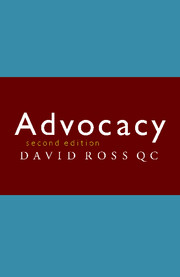Book contents
- Frontmatter
- Contents
- Foreword
- 1 The nature of advocacy
- 2 Preparation
- 3 Witnesses and questions
- 4 Examination-in-chief
- 5 Cross-examination: its qualities
- 6 Cross-examination: method and style
- 7 Cross-examination of experts
- 8 Cross-examination on documents
- 9 Re-examination
- 10 Admissibility, objections and submissions
- 11 The addresses
- 12 Plea in mitigation
- 13 Appeals
- 14 Legal writing
- 15 Etiquette and ethics
- Index
15 - Etiquette and ethics
Published online by Cambridge University Press: 31 January 2011
- Frontmatter
- Contents
- Foreword
- 1 The nature of advocacy
- 2 Preparation
- 3 Witnesses and questions
- 4 Examination-in-chief
- 5 Cross-examination: its qualities
- 6 Cross-examination: method and style
- 7 Cross-examination of experts
- 8 Cross-examination on documents
- 9 Re-examination
- 10 Admissibility, objections and submissions
- 11 The addresses
- 12 Plea in mitigation
- 13 Appeals
- 14 Legal writing
- 15 Etiquette and ethics
- Index
Summary
Introduction
[15000] Throughout the book I have referred to ethics and etiquette. In this last chapter I will simply list the responsibilities of an advocate without further comment. If you are in doubt about any matter in a case, consult the ethics committee of your Bar or Law Society.
Parties and witnesses
[15005]
If you act for more than one party, you risk a conflict of interest.
Some Bars allow you to see the client and the witnesses, and some not. If you do see them, have someone else present, speak to them one by one, suggest no line and do not say what another witness has told you.
Before court
[15010]
Send the court and your opponent any written submissions.
Send the court and your opponent any list of authorities and a copy of any unreported judgment on which you rely. Always cite the authorised reports.
Make sure you have all of the papers you need.
Dress properly, either in robes or conservative formal dress.
Arrange to be on time.
Do not talk to the judge alone about the case.
If you negotiate with your opponent, make a note of it.
Draft possible orders.
In court before your case is heard
[15015]
Observe the courtesy of the Bar table. Those senior to you will have the seats and will mention their cases before yours.
Do not speak or move when a witness is being sworn or affirmed.
Speak quietly and only if necessary. Better still, pass a note.
Negotiate with your opponent outside court.
Switch off mobile phones.
Do not carry newspapers unless necessary for your case.
[…]
- Type
- Chapter
- Information
- Advocacy , pp. 165 - 167Publisher: Cambridge University PressPrint publication year: 2007

